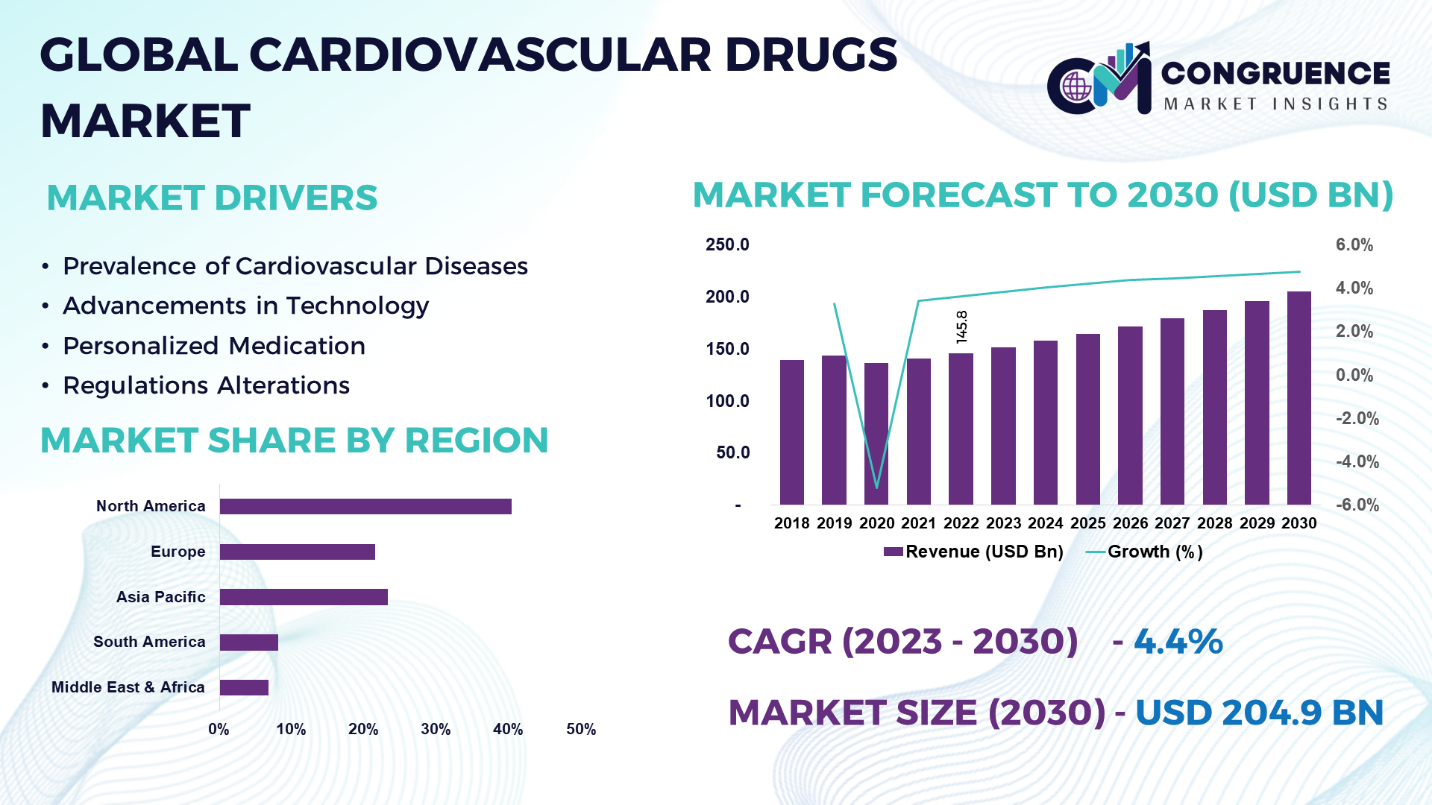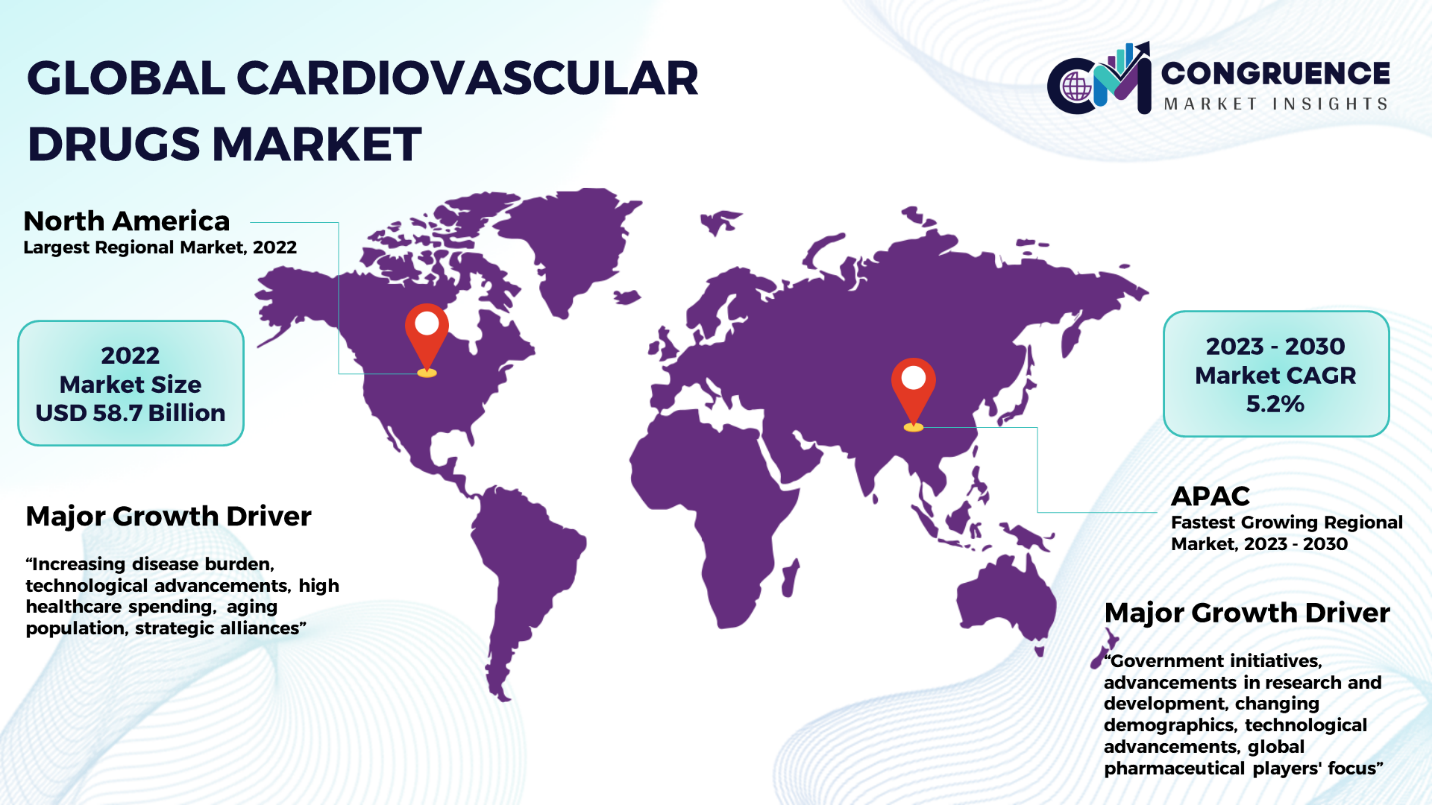Reports
The Global Cardiovascular Drugs Market was valued at USD 145.8 Billion in 2022 and is anticipated to reach a value of USD 204.9 Billion by 2030 expanding at a CAGR of 4.4% between 2023 and 2030.
Cardiovascular illnesses are ailments or abnormalities that impact the anatomy and physiology of the heart and blood arteries. It is acknowledged that one of the leading causes of death worldwide is cardiovascular disease. It typically lasts for a long time and primarily affects the elderly. Patients on cardiovascular medications cannot just stop taking them since doing so necessitates making an accurate assessment of their cardiac health, which could be dangerous in the long term. The market for cardiovascular medications includes a broad spectrum of pharmaceutical therapies for various cardiovascular conditions, such as angina, heart failure, and arrhythmias. These pharmacological treatments lower the risk of heart attacks and strokes, manage hypertension, and regulate cardiac rhythm. Novel medicine formulations and state-of-the-art technology aimed at battling cardiovascular disorders have changed the market's landscape in recent years. The market for cardiovascular medications is expected to experience significant expansion in the coming years as a result of factors such as an aging population, a rise in the incidence of cardiovascular diseases, and a growing need for individualized medical treatments. Furthermore, the confluence of technological advancements, such as artificial intelligence and remote monitoring devices, has the potential to lower healthcare costs and enhance patient outcomes.

Cardiovascular Drugs Market Major Driving Forces
Prevalence of Cardiovascular Diseases: It is expected that the market for cardiovascular medications would grow significantly, mostly due to the increased prevalence of cardiovascular disorders. Globally, the prevalence of cardiovascular illnesses is rising due to changing lifestyles, unhealthy diets, and insufficient physical activity. Given that cardiovascular illnesses are more common in the elderly people; the growing geriatric population also plays a major role in the market expansion for cardiovascular medications.
Advancements in Technology: Drug development technology breakthroughs have made a substantial contribution to increasing the effectiveness of cardiovascular medications. Improved medications that can target particular disease mechanisms have been developed as a result of a greater understanding of cardiovascular illnesses, improving the medication's efficacy and safety. Access to cardiovascular medications is expanding due to the development of healthcare infrastructure in developing nations and growing healthcare costs.
Personalized Medication: The market for cardiovascular medications has also been significantly influenced by the growing need for individualized medicine. The growing use of combination medicines and favorable reimbursement policies are driving market expansion. In the field of cardiovascular medications, research and development have also received a lot of attention.
Regulations Alterations: Modifications to regulations may have an effect on the market for cardiovascular medications. More focus is being placed by regulatory bodies on safety and efficacy requirements, which has led to stricter rules for medication developers. The market for cardiovascular drugs may be impacted by a number of cutting edge technologies, including gene therapies, which have demonstrated promise in the treatment of cardiovascular illnesses.
Cardiovascular Drugs Market Key Opportunities
Growing Use of Combination Therapies: Combining medications with different modes of action has shown promise in the treatment of cardiovascular illnesses. Benefits of combination therapy include reduced side effects, increased efficacy, and synergistic effects. Given this need and the efficacy of combination therapy, combination medications are proliferating in the marketplace.
Growing Need for Retail Drugstores: Opportunities for market expansion may arise from the rise in the number of retail pharmacies in highly developed nations and the increase in the number of medications for cardiovascular disease that are supplied via these establishments. Furthermore, since retail pharmacies are more conveniently accessible, people prefer to buy medications from them.
Customization and Personalization: More and more patients are looking for specialized and distinctive medicine. Manufacturers of cardiovascular medications may provide customization choices, enabling medical professionals to write prescriptions that are specific to each patient's needs. This trend opens up new markets for premium and niche products by increasing customer involvement and brand loyalty.
Cardiovascular Drugs Market Key Trends
· One of the most significant developments in the industry is the increasing use of combination medicines for the treatment of cardiovascular illnesses. Combination therapies treat a condition by using two or more medications.
· The utilization of customized treatment plans based on a patient's genetic composition, or precision medicine, is another important trend propelling the market for cardiovascular medications.
· The creation of cutting-edge drug delivery methods is another development driving the cardiovascular medication industry. The goal of these systems is to lower the possibility of negative side effects while improving medication delivery to the targeted location.
· The healthcare sector is placing more emphasis on patient-centered care, and this development is having an impact on the market for cardiovascular medications. Placing the patient at the center of care and using a holistic approach are components of patient-centered care.
Region-wise Market Insights
North America accounted for the largest market share at 40.3% in 2022 whereas, Asia Pacific is expected to register the fastest growth, expanding at a CAGR of 5.2% between 2023 and 2030.

The North American market dominates due to aging populations and increased rates of cardiovascular disease. It suggests that improvements in preventative care, technological advancements, and lifestyle changes can enhance heart health in the area. One factor contributing to cardiovascular disease in North America is population aging. Diabetes, high blood pressure, and high cholesterol increase the risk of heart disease as people age. It is anticipated that heart disease will increase in North America. Elderly heart disease prevention is receiving more attention. Unhealthy lifestyles are becoming more prevalent. Heart disease risk factors include inactivity, poor diet, and smoking. Convenience food and screen time are causing people to make bad decisions. The Asia Pacific region has led the market for cardiovascular drugs due to factors including increasing medical expenses, a shift in lifestyles, increasing rates of cardiovascular disorders, and enhanced accessibility to treatment. Government investments in healthcare infrastructure are driving further market growth in nations such as China and India. The European Union's cardiovascular drugs market has been expanding dramatically, largely due to a highly developed healthcare system, a big patient population with cardiovascular disorders, and a high rate of acceptance of innovative treatment options. The market is expanding as a result of increased emphasis on cardiovascular medicine research and development.
Market Competition Landscape
Pharmaceutical companies are engaged in fierce rivalry in the global cardiovascular medicine market as they attempt to address the rising incidence of cardiovascular disorders around the globe. Global pharmaceutical behemoths such as Pfizer, Novartis, AstraZeneca, and Merck & Co. are some of the major participants in this sector. Through a combination of R&D initiatives, strategic alliances, and acquisitions to expand their portfolios of cardiovascular drugs, these corporations compete for market share. A wide variety of medication classes, such as beta-blockers, statins, anticoagulants, and angiotensin-converting enzyme (ACE) inhibitors, characterize the landscape. The competitive landscape has also become more complex due to the introduction of new anticoagulants and PCSK9 inhibitors, among other revolutionary medicines. Regulation dynamics also have an impact on the market as businesses deal with strict approval procedures and patent expirations. An additional layer of competition is created by the growing emphasis on precision therapeutics and personalized medicine in cardiovascular care, as businesses strive to create customized treatments based on the unique characteristics of each patient. Prominent players in the market include:
· Bristol-Myers Squibb Company
· Pfizer Inc.
· Bayer AG
· Janssen Pharmaceuticals, Inc.
· AstraZeneca
· Sanofi
· Novartis AG
· Merck & Co., Inc.
· Gilead Sciences, Inc.
· Hoffmann-La Roche Ltd.
Among the leaders in the creation of cardiovascular medications is AstraZeneca. Brilinta, for example, lowers the risk of heart attack and stroke in individuals with acute coronary syndrome. Another significant competitor in the cardiovascular sector is Pfizer, which produces medications such as Lipitor, which is used to treat excessive cholesterol. Another well-known company is Sanofi, which makes significant medications such as Lantus, which lowers the risk of heart disease in patients with diabetes. With medications such as Diovan and Entresto, Novartis is a significant participant in the treatment of hypertension and heart failure as well. With important medications such as Efficient, which lowers the risk of blood clots in patients with acute coronary syndrome, Daiichi Sankyo is another big competitor in the cardiovascular sector. Another significant player is Bristol-Myers Squibb, which makes medications notably Plavix, which lowers the risk of heart attack and stroke in those with cardiovascular disease.
|
Report Attribute/Metric |
Details |
|
Market Revenue in 2022 |
USD 145.8 Billion |
|
Market Revenue in 2030 |
USD 204.9 Billion |
|
CAGR (2023 – 2030) |
4.4% |
|
Base Year |
2022 |
|
Forecast Period |
2023 – 2030 |
|
Historical Data |
2018 to 2022 |
|
Forecast Unit |
Value (US$ Bn) |
|
Key Report Deliverable |
Revenue Forecast, Growth Trends, Market Dynamics, Segmental Overview, Regional and Country-wise Analysis, Competition Landscape |
|
Segments Covered |
· By Diseases (Hypertension, Dyslipidemia, Inflammatory Heart Disease, Ischemic Heart Disease, Others) · By Treatment (Antiplatelet, Agents, Beta-Blockers, Angiotensin-Converting Enzyme Inhibitors, Others) · By Route of Administration (Oral, Parenteral, Others) · By End-Users (Hospitals, Homecare, Specialty Clinics, Others) · By Distribution Channel (Hospital Pharmacy, Online Pharmacy, Retail Pharmacy) |
|
Geographies Covered |
North America: U.S., Canada and Mexico Europe: Germany, France, U.K., Italy, Spain, and Rest of Europe Asia Pacific: China, India, Japan, South Korea, Southeast Asia, and Rest of Asia Pacific South America: Brazil, Argentina, and Rest of Latin America Middle East & Africa: GCC Countries, South Africa, and Rest of Middle East & Africa |
|
Key Players Analyzed |
Bristol-Myers Squibb Company, Pfizer Inc., Bayer AG, Janssen Pharmaceuticals, Inc., AstraZeneca, Sanofi, Novartis AG, Merck & Co., Inc., Gilead Sciences, Inc., Hoffmann-La Roche Ltd |
|
Customization & Pricing |
Available on Request (10% Customization is Free) |
